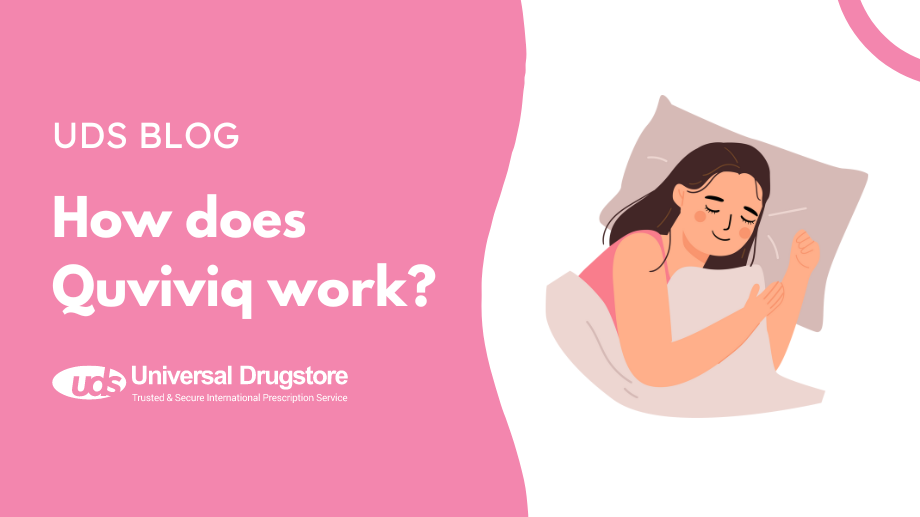How does Quviviq work?

If you struggle with insomnia, you might feel physically tired but mentally alert, unable to fall asleep due to overactive wake signals in your brain. Quviviq (daridorexant) is a dual orexin receptor antagonist (DORA) that addresses this issue by turning down those wake signals.
It works in the hypothalamus by blocking the action of orexin, a protein responsible for wakefulness. By targeting two orexin receptors—OX1R and OX2R—Quviviq prevents orexin from signaling your brain to stay awake. This can help you fall asleep more quickly and stay asleep longer.
Who can take Quviviq?
Quviviq is approved for adults with:
- Sleep onset insomnia – difficulty falling asleep
- Sleep maintenance insomnia – waking up during the night and having trouble falling back to sleep
Your healthcare provider may prescribe Quviviq for either or both of these types of insomnia.
What are the possible side effects of Quviviq?
Common side effects include:
- Headache
- Drowsiness (somnolence)
- Dizziness
- Nausea
Serious but rare side effects include:
- Severe allergic reactions (e.g., hives, swelling, breathing issues)
- Complex sleep behaviors (e.g., sleepwalking, sleep-driving, sleep-eating)
- Daytime sleepiness and impaired alertness
- Suicidal thoughts, worsening depression or anxiety
- Sleep paralysis, hallucinations, and cataplexy-like symptoms
- Worsened breathing in people with COPD or sleep apnea
Report side effects to your provider or to the FDA at 1‑800‑FDA‑1088 or www.fda.gov/medwatch.
Are there any drug-drug interactions with Quviviq?
Quviviq may interact with many medications. Let your healthcare provider know if you take:
- Other sleep aids (e.g., Ambien)
- HIV medications (e.g., indinavir)
- Benzodiazepines (e.g., diazepam, lorazepam)
- Opioids (e.g., hydrocodone, oxycodone)
- Antifungals (e.g., ketoconazole, itraconazole)
- Antibiotics (e.g., clarithromycin, ciprofloxacin)
- Seizure drugs (e.g., carbamazepine, phenytoin)
- Muscle relaxants (e.g., baclofen, cyclobenzaprine)
- Antidepressants (e.g., amitriptyline, trazodone)
- Herbal remedies (e.g., St. John’s Wort, valerian, melatonin)
- Alcohol
What should you tell your healthcare provider before starting Quviviq?
Make sure your doctor is aware if you have or have had:
- Depression or mental health issues
- Substance abuse or addiction
- Cataplexy or narcolepsy
- Breathing conditions (e.g., sleep apnea, COPD)
- Liver problems
- Are pregnant or plan to become pregnant
- Are breastfeeding or plan to breastfeed
If you take Quviviq while pregnant, consider enrolling in the pregnancy registry by calling 1‑833‑400‑9611.
Is Quviviq a controlled substance?
Yes. Quviviq is a Schedule IV controlled substance due to its potential for abuse or misuse. However, clinical trials did not show withdrawal symptoms after nightly use and discontinuation.
Does Quviviq work immediately?
On average, Quviviq takes 30–40 minutes to begin working. The 50 mg dose typically works a little faster than the 25 mg dose. Taking it with food may delay its effect by over an hour.
Does Quviviq work the first night?
You may begin to notice some improvement after a few nights, but it can take a few weeks for full benefits. In clinical studies, people fell asleep about 30 minutes faster and gained 35–45 minutes of total sleep time after a month of use.
How is Quviviq different than Ambien?
Both Quviviq (daridorexant) and Ambien (zolpidem) are oral treatments for insomnia, but they work differently:
- Mechanism: Ambien enhances GABA activity to sedate the brain. Quviviq blocks orexin to reduce wakefulness.
- Side Effects: Both can cause drowsiness, dizziness, and complex sleep behaviors. Ambien may also cause dry mouth, back pain, and sinusitis more frequently.
- Withdrawal Risk: Ambien has a higher risk of dependence. Quviviq did not cause withdrawal symptoms in clinical studies.
- Dosing: Ambien is often used as needed, while Quviviq is taken every night.
- Formulation: Quviviq is available as 25 mg and 50 mg tablets. Ambien comes in immediate-release, extended-release, and sublingual forms.
Related Medications
Sources
- Quviviq – daridorexant tablet, film coated [package insert]. Idorsia Pharmaceuticals Ltd. (2023). Accessed July 1, 2024.
- Kunz, D., et al. (2022). Long-term safety and tolerability of daridorexant. CNS Drugs. Accessed July 1, 2024.
- Mignot, E., et al. (2022). Safety and efficacy of daridorexant. The Lancet. Accessed July 1, 2024.
- Muehlan, C., et al. (2023). Orexin receptor antagonists and insomnia. Journal of Sleep Research. Accessed July 1, 2024.
- Quviviq (daridorexant). Medscape. Accessed July 1, 2024.
- Zolpidem tartrate tablet, extended release [package insert]. Breckenridge Pharmaceutical, Inc. Accessed July 1, 2024.





